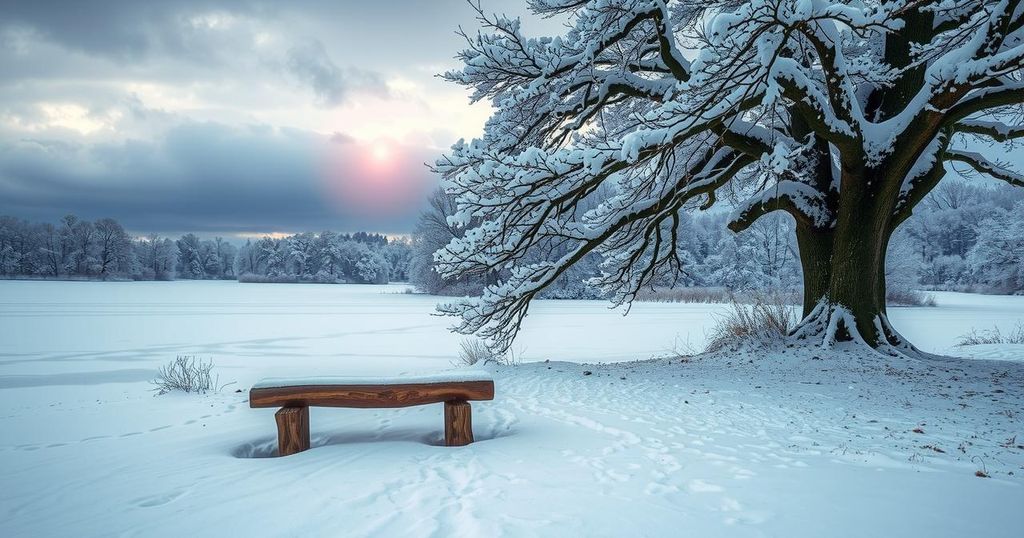Weather
AFRICA, APPALACHIAN POWER, ATLANTIC, BLACKSBURG, CALIFORNIA, CLIMATE, EAST TENNESSEE, EMERGENCY MANAGEMENT, EUROPE/ASIA, EVACUATIONS, GEORGE WASHINGTON MEMORIAL PARKWAY, GEORGIA, GLENN YOUNGKIN, KANSAS, KENTUCKY, NATIONAL PARK, NATIONAL WEATHER SERVICE, NEW JERSEY, NORTH AMERICA, NORTH CAROLINA, POTOMAC RIVER, RAIN, ROANOKE, ROANOKE VALLEY, SERVICE, SOUTH AFRICA, SOUTHERN CALIFORNIA, TENNESSEE, THUNDERSTORMS, U. S. ARMY CORPS OF ENGINEERS, UNITED STATES, VIRGINIA, WEATHER, WEST VIRGINIA
David O'Sullivan
0 Comments
Virginia Declares Emergency as Snow and Ice Storm Approaches Mid-Atlantic States
A winter storm is approaching the mid-Atlantic states, particularly Virginia and West Virginia, with significant snow and ice accumulations expected. Governor Glenn Youngkin has declared a state of emergency, closing schools and offices. Travel conditions are predicted to deteriorate, leading to potential power outages. The weather service forecasts a transition to rain, while severe cold and additional storms are impacting other regions, including California and Montana.
A significant snow and ice storm is approaching the mid-Atlantic region, with substantial accumulations anticipated, raising concerns of power outages. The National Weather Service has warned that travel conditions in Virginia and West Virginia will become hazardous from Tuesday evening through early Wednesday. As a precaution, Virginia’s Republican Governor Glenn Youngkin declared a state of emergency, enabling state agencies to support local governments with the impending storm.
Schools and government offices across Virginia closed on Tuesday, with forecasts predicting heavy snow of up to 10 inches in certain areas of northern and central Virginia and eastern West Virginia. Ice accumulations vary widely, with a light glaze expected in Kentucky and West Virginia, while southwest Virginia could see up to half an inch of ice, leading to probable power outages and tree damage.
Western Virginia, North Carolina, and other regions are experiencing a mixture of snow and sleet, contributing to deteriorating road conditions. The National Weather Service’s office in Blacksburg reminded residents that winter is not over yet. As the storm develops, Appalachian Power has requested aid from neighboring utilities, mobilizing additional workers to address power outages.
In East Tennessee, the potential for flooding is significant, with forecasts warning of up to 8 inches of rain by the week’s end. To mitigate flood risks, the U.S. Army Corps of Engineers is lowering lake levels and emptying storage reservoirs. Park services in northern Virginia have also closed specific highways due to anticipated winter storm impacts.
Winter storm warnings stretch from Kentucky to southern New Jersey, alongside a flood watch in several other states. The current mix of snow and ice is predicted to transition to rain as temperatures rise by Wednesday afternoon. Meanwhile, a different storm system is expected to bring heavy snowfall from Kansas to the Great Lakes on Wednesday. Dangerous cold fronts have also spread from Portland, Oregon, to the Great Lakes, exacerbating winter weather risks.
In Detroit, it was reported that two children under the age of ten likely succumbed to exposure after being found in a van in a casino parking garage. Local police noted that this tragedy need not have occurred. In response to severe weather, officials in Portland, Oregon, will open emergency shelters and provide outreach for those in need as temperatures plunge below freezing.
The National Weather Service predicts freezing temperatures will persist, further complicating the situation for vulnerable populations. In Montana, temperatures could attain lows of minus 33 degrees Fahrenheit, prompting local advocates to distribute essential winter gear to individuals experiencing homelessness. Heightened efforts to support affected individuals are critical during such extreme conditions.
Lastly, California is preparing for an incoming atmospheric river set to begin Thursday, promising heavy rainfall and significant snowfall in the Sierras. These weather events highlight the necessity of preparedness and robust responses to protect public safety and community well-being amid ongoing winter storms and unpredictable weather patterns.
In conclusion, a winter storm is poised to bring hazardous conditions to the mid-Atlantic region, particularly Virginia and West Virginia. The storm’s potential for significant snowfall and ice poses risks of power outages and travel difficulties. Emergency measures are being implemented across various states to safeguard residents, particularly those vulnerable to extreme weather. Adequate preparations and community support resources remain crucial as these severe weather patterns unfold.
Original Source: www.pbs.org




Post Comment